#Storytelling expert
Explore tagged Tumblr posts
Text
The fuckin garbage thing is that radahn/miquella should have been a use-the-force-luke guided missile right up my specific fucking alley, I mean:
- fatalistic ideologue + devoted vassal? 👍
- literal star crossed lovers?? 👍👍
- gods cursed to fates they simultaneously strive for and yet do not fully understand???? 👍👍👍
- brotherfuckers?????? 😮
And yet there is so little substance to this ship that I can't even make up something to do with it. It's just. A dead end of zero buildup, zero interactions, zero environmental details, just a couple item descriptions that are totally exclusive to the AU bubble of the DLC and not foreshadowed or hinted at anywhere else
Like it would not have been difficult to include .... Literally anything that tied radahn personally to miquella in the base game. Give him a single haligtree crest on his armour somewhere, have him use even one of miquella's miracles, sneak in there somewhere that he's got mysterious beef with mohg, have him wearing a golden lock of mystery hair in his-- like, fromsoft, this is literally your whole deal, this is the reason your games have a whole category of games named after them, if you are not supposed to be the kings of environmental storytelling, who the fuck is?
Like I still cannot reconcile the HUGE FUCKIN PLOTHOLE that is radahn NOT throwing the fight with malenia. Like if he was a willing participant in this 5D chessmaster plan, surely the whole point of the whole war was that radahn ACTUALLY DIES at malenia's hand. But he doesn't fucking die. Radahn resists malenia for real and he doesn't fucking die. He does not throw the fight, he does not let her kill him. Like how are we supposed to reconcile that very concrete plot point with "radahn agreed to die so he could be miquella's consort"? He didn't fucking die!
Headcanon: everything related to radahn in the DLC is miquella's propaganda campaign to paint a pretty story ahead of his ascension to godhood and radahn's forcible ascension as his elden lord
#elden ring#shadow of the erdtree#like i pulled an entire ship out of one disembodied voice and an old man talking in his sleep i do not need a lot to work with#i am an expert at decoding fromsoftian storytelling#miquella/radahn came out of such a nowhere that i still don't know how to justify it without changing stated faxts--#--and it's supposed to be canon!!???
34 notes
·
View notes
Text

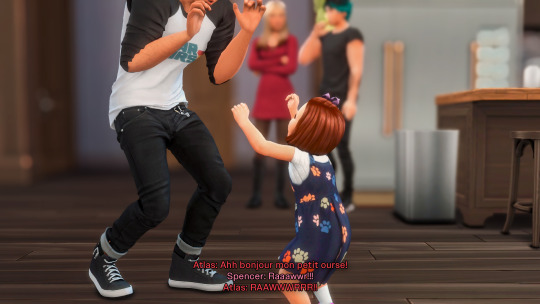



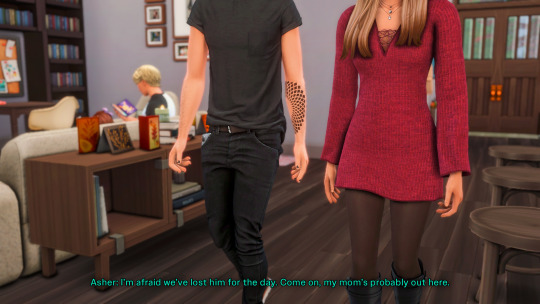
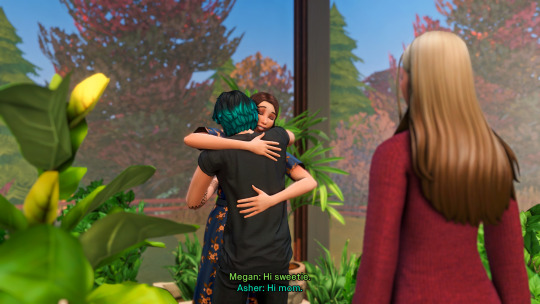

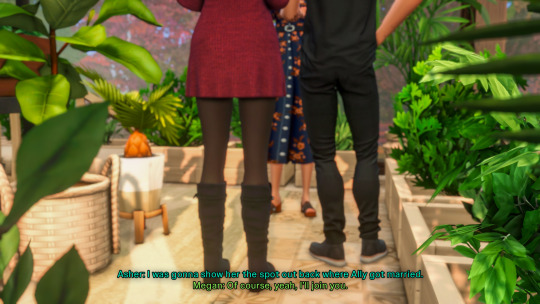

Prev // Next
Transcript:
Spencer: [squealing] Asses!!!
Atlas: Ahh bonjour mon petit ourse! Spencer: Raaawwr!!! Atlas: RAAWWWRRR!!
Asher: [laughs] That would be Spencer. Dawn: Does he always talk to her in French? Asher: Just a little bit here and there. She loves it. Dawn: Cute. Asher: Yeah, it is.
Spencer: Eevuh! Atlas: Livre? Hmm. Spencer: Peeeas?
Atlas: Ok, let’s go pick one.
Asher: I’m afraid we’ve lost him for the day. Come on, my mom’s probably out here.
Megan: Hi sweetie. Asher: Hi mom.
Asher: This is Dawn, Atlas’s sister. Megan: Oh Dawn, I’m so glad you’re here, it’s great to finally meet you. Dawn: Thank you, it’s wonderful to meet you too, Mrs. Goode. Asher: Doctor. Megan: No need for formalities. Please, call me Megan.
Asher: I was gonna show her the spot out back where Ally got married. Megan: Of course, yeah, I’ll join you.
#i adore spencer sm 🥹#and atlas is soooo cute with her#i have plans for her in the future#so might as well get to know her now#also i hate that a big beautiful spot like this isn't buildable#but apparently that won't stop me#cos how can i make a wedding as torturous as possible on myself?#by building the venue entirely with the tool mod#that i barely know how to use#time to become an expert real quick#n e way#short posts this week cos i'm behind#and am trying not to skip any days#ts4#ts4 simblr#ts4 story#sims 4#sims 4 storytelling#sims 4 challenge#starsignchallenge#starsignlegacychallenge#gen1 aries#aries pt3#dawn stephens#atlas stephens#asher goode#megan goode#spencer goode
73 notes
·
View notes
Text

Once, there was a huntress who walked in loops.
Each step mirrored another taken long before, though the ground beneath her feet felt new.
The huntress's bow sang to the machines. Her arrows carved new paths from their hollow shells.
But once the arrows land and silence falls, the girl couldn't help but wonder. Was she carving paths, or merely treading one already written?
Her steps faltered only once when she found a message carved in stone, signed by only her own hand.
LOG_ENTRY="You are not trapped. The loop is the lesson."
Each loop tightened like a noose until she realized: the way out was not to break it but to understand it.
#horizon forbidden west#horizon photomode#hfw photomode#virtual photography#aloy#experimenting with storytelling question mark#dumb post#i'm not a coding expert either so if it's silly please ignore it
15 notes
·
View notes
Text
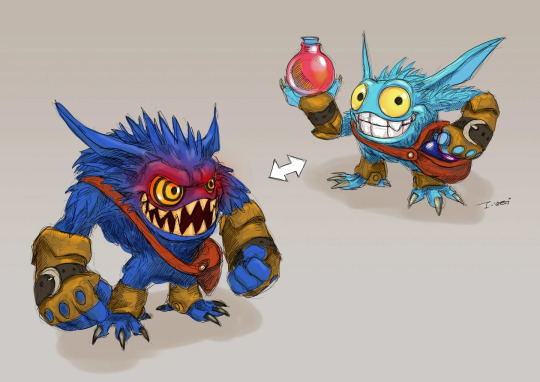
Did you know? Pop Fizz was originally known as the Alchemist early on in development.
#Skylanders#Skylanders Giants#Skylanders Swap Force#Skylanders Trap Team#Skylanders Imaginators#Skylanders Universe#Magic Skylanders#Male Skylanders#Playable Characters#LightCore Skylanders#Core Skylanders#Series 2 Skylanders#Helper Spawning Skylanders#Series 3 Skylanders#Skylanders with Chageable Forms#Imaginators Characters#Storytellers#Expert Skylanders#Gremlins#Pop Fizz#LightCore Pop Fzz#Super Gulp Pop Fizz#Fizzy Frenzy Pop Fizz#Trivia#Concept Development
44 notes
·
View notes
Text
veilguard doesnt let you assume or hypothesize ANYTHING by yourself bro...i hate it. immediately after presenting an idea it will provide you with all the possible avenues of thought there is no subtlety to this game
#screw regrets of the dread wolf all my homies hate regrets of the dread wolf#sure lets all sit down and yap in a trust circle to theorize events that happened in solas' past while the world is currently ending#no organic dialogue? no companion theories DURING the quests that we can respond to and then use our own imaginations to fill in holes?#while giving us enough context clues to provide us with the bigger picture? you know...like good storytelling?#this whole game is so hamfisted about its morals. its got about as much finesse as a bull in a china shop#& its so crazy because the PLOT is FULL of forcing information onto you & then the CHARACTERS lack depth! thats insane!!!!!!!#i still stand by the fact that new companions were unnecessary because they dont bring any new concepts to the table#weve had an abomination companion. weve had a crow. a tal-vashoth. a detective. an eluvian expert. a grey warden.#fade expert...you mean THE INQUISITOR?#da4 critical#veilguard critical
15 notes
·
View notes
Text
right so i have over two thousand hours in skyrim now but only just completed the main questline for the first time and
y’all what the fuck was that
#odahviing took more time to kill than alduin#the whole questline is what 4 hours? and most of it is fast travelling between speaking with a bunch of different characters?#im just#flabbergasted#also i guess it's supposed to be super cool fighting alduin with the three dudes at the end but also like#we see these characters for ONE scene beforehand#and i know the point of this style of game is non-linear storytelling and exploration#and youre supposed to do this quest fairly early game#but also#WHERE is the tension and threat of consequence#world-eater my ass#he went down in literally less than a minute to a level 40 button-masher who hasnt maxed out ANY of their skills yet#wait wait and i was on EXPERT too??#anyway i love this game would die for this game but ohhhh boyy did this quest leave a fucking LOT to be desired#cj rambles
8 notes
·
View notes
Text
"Heihachi did nothing wrong by throwing that kid off a cliff" MAX I KNOW (AT LEAST I HOPE) YOURE JOKING BUT HEIHACHI LITERALLY KICKSTARTED THE WHOLE THING BY THROWING THAT KID OFF A CLIFF
#see heihachi is truly an expert manipulator even in a meta way bc he successfully blindfolded 2/3 of the tekken fanbase#into forgetting he is 100% the origin of everything evil in this game's fucking lore. pre-retcon post-retcon everything#being kazuya's lawyer is so fucking hard its like being the only one with a brain and a basic understanding of storytelling#HE WAS 5‼️‼️‼️ HE DIDNT DO ANYTHING WRONG‼️‼️‼️ HE IS SUPERNATURALLY AND GENETICALLY EVIL AND THATS OUT OF HIS CONTROL‼️‼️‼️#fucking hell. he may not be treated as one in the narrative (except maybe by jun. ilu jun🤍) but hes such a tragic figure to me#anyway max is entertaining to watch while i hunt but goddamn if he doesnt say things that INFURIATES me from time to time#tagging later
21 notes
·
View notes
Text
Why Kawi is so Ace-coded (and anxious)[Cinematography wise]
I decided in order to keep discussing and analyzing Be My Favorite EP10 with @pinkkop and @rocketturtle4 posts on board, I want to point out more details and signs. Disclaimer: I may not know the depth of sexually-undesiring allo people but I know my visual storytelling tools when I see some.
It seems like there are two camps of viewers who view Kawi as ace vs who view Kawi as just hesitant to changes/intimacy. As a proud and hopeful member of the first camp, I want to show why do I think Kawi always felt somewhat ace-apec, but especially it kicked the ace people right in the heart in Episode 10. We talked about all the too intentional lines (ace-core from Kawi and ace-phobic from Max & Pisaeng) so I'm not pausing for them much.
So, Kawi has gone 30 years without relationship or sleeping with someone, or even trying. As @pinkkop said, how come he realizes he's queer only now? We have Max and Pisaeng who know they're gay for years, and a lot of queer people find their heart doesn't align with society norms in youth. But ace people often don't realize they are queer until 20+ or even 30+.
Kawi has lived with his romantic crush on Pear for years and a couple of time travels. As we know, he doesn't know how to navigate the relationship once he gets it, once he starts dating her, he can't give her marriage and a kid (partially because he was not ready and it wasn't what he needed/wanted, he wanted only the idea of dating Pear and stop being a loser). Not once he commented or agreed with Not & friends talking about Pear being hottest girl in uni (tho mostly it was Pisaeng dealing with it) – Kawi liked her for being kind and caring.
But then, he fell in love with Pisaeng. He started dating Pisaeng. Is he ready to go further? No, and there could be plenty of reasons, ranging from anxiety, self-doubts and trauma to lack of desire. He drank just to be able to kiss him, ffs. I am sure Kawi has a lot of psychological things holding him back from trying, it's been established, but that's not all of it in my opinion.
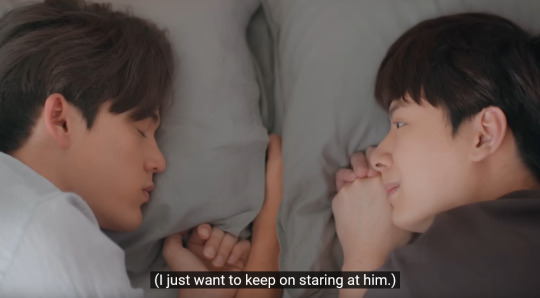
I'll put the rest under the cut because I feel like this post will be too long with all the screenshots, feel free to read the rest of it and let me know your thoughts~
Whenever in BL main characters end up on one bed, it's almost inevitable trope of 'will they won't they'. BMF teased us the other day with the drunk brave kiss from Kawi:
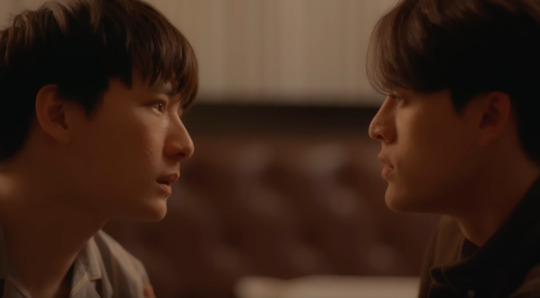
And that's how you show someone's desire to kiss: Kawi was staring at Pisaeng for minutes (notably, Pisaeng didn't have any thoughts until Kawi demanded attention and meaningfully stared some more). Everything slows down, you get some slow music, you cut down to faces/details to express emotions and let the viewer absorb the atmosphere (romantic or sexual or even inner dramatic turmoil – all the important bits use tools like this).
That's how I know Kawi wants to kiss. Kawi will want to keep kissing Pisaeng even when sober, once he gets past his block. Yeah, ace people can be comfortable with kissing too.
But do we ever get an impression Kawi wants to have sex with Pisaeng? Are we ever shown this? Not in my humble opinion.
Kawi doesn't touch Pisaeng much when kissing him. In fact, I think that scene is the only instance. We have talked about how intentional not-touching is seen with Pisaeng and Kawi relationship development, sorry I won't find those comments now. Then Kawi conveniently gets what he wanted (da kiss) and falls back asleep:D While Pisaeng is having his slow-close-up romantic moment by himself:
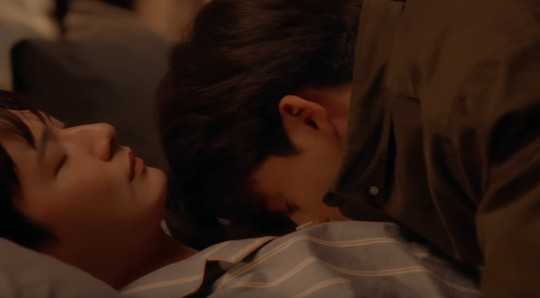
Now, fast forward to the future (but not the Future future) - Kawi is sober, lies in bed with Pisaeng (way less sober last night), already happy in a brand new relationship... and the only thoughts he's having is how Pisaeng is good looking and they are dating now.
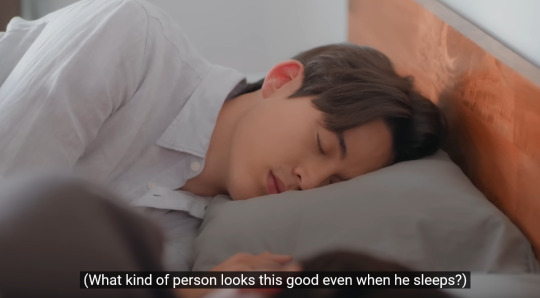
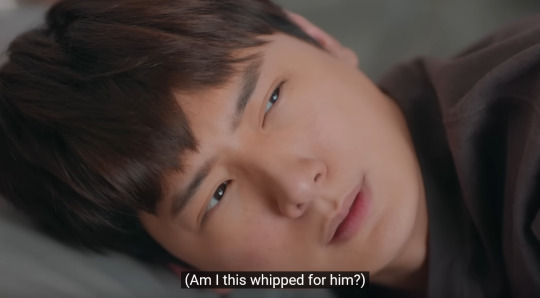
I think I can safely bet how in all the other BLs there is usually a moment to close up on the romantic interest's face, or lips, longing stare showing the MC's desire to be intimate with your love. It's in 99% of the shows. Kawi has none of it. He just has a funky cute dialogue in his head that says 'I just want to keep staring at him' (and nothing else huh?)
The next trope BLs just love to use is someone undressing in front of their crush/partner. Let me just pull the scene from The Eclipse out (I wish I could compare it to P'Waa other works but BMF is his first BL, yet he definitely knows how to use visual tools)
youtube
Here at 2:25 we have Akk, a guy, inexperienced with dating and relationships too AND having insane amount of trauma, anxiety, self-doubts and holding back. So much that he has to break down crying several times to allow himself seek his own love and happiness. And yet in the beginning of his journey he still CLEARLY shows his interest in Ayan, even when they are enemies/rivals. It comes with:
staring at Ayan, looking him up and down, swallowing, turning his head away (indication of being flustered and having dirty thoughts)
close-ups on Ayan undressing
sexy music as bgm
And then we get his feelings and desire confirmed with very hot bed kiss that Akk, turns out, literally fantasized. (i actually was headcanonning akk as ace-spec but i accepted that wasn't the case as the show went on and we got shown more so yeah i can change my mind but kawi is heavily aced in 10 episodes and it's not stopping so far)
Compare the similar scene and trope with Kawi and Pisaeng undressing. Kawi is confused, mildly annoyed?, not a single swallow or eyes running away until he takes a hint (accompanied by the familiar sound that BMF uses for 'oh shit' realization). Funky comedic music on the background (and we know BMF does have osts for the romantic mood). Most importantly, there is never close-up/detail shot on Pisaeng.
Detail shots are 100% the go-to when you want to show desire, as I already said. Put a close up on the detail on someone else's body and add person's face reaction. Boom, you've got it.
Like, see the difference? Do you see it? That's Akk's POV.
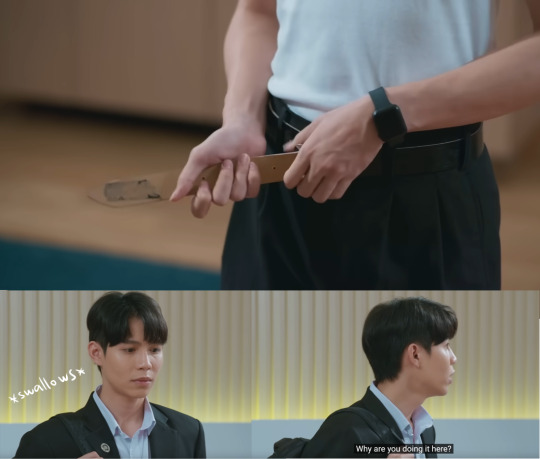
And that's Kawi's POV:
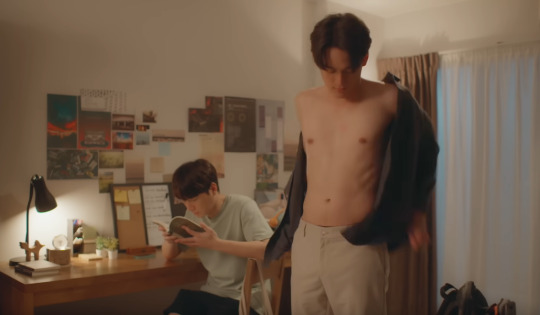
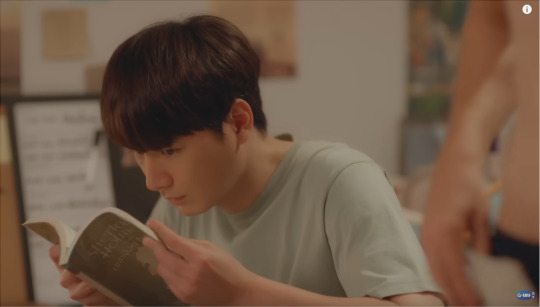
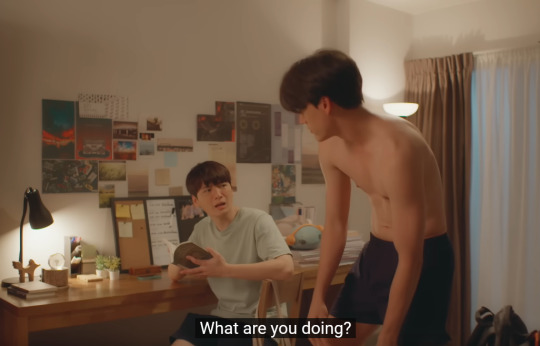
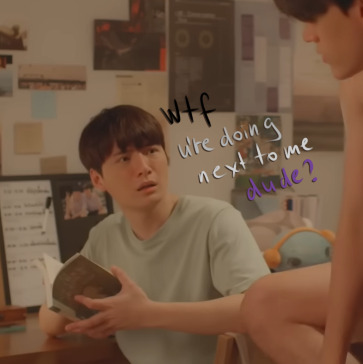
Mind you, these are ALREADY BRAND NEW BOYFRIENDS. All poor Pisaeng gets is half- and full-body shots (adding to the comedy/simply telling what's happening), no slowing down the narration - and all the detailed looks on his body are simply out of focus, on the edge of the frame. I am fascinated by this cinematography.
We literally can see the book Kawi reads clearer than Pisaeng having his sexy striptease alone. Kawi is more interested in reading Sherlock Holmes than ogling Pisaeng and fantasizing about being close to him (even with all the inner turmoil he could be having – he is having it later, once he catches up on Pisaeng's blunt hit of inviting him to the shower and condoms in his backpack). it's also funny how kawi has the time to nag pisaeng about towel but since it's improv from krist to gawin who kept forgetting it, i'm not taking it seriously
Even then, his thoughts are confidently said out loud 'can we not have any sexual activities at all?', avoiding staying alone with Pisaeng in his room, 'i don't want to ride, i'm just here to take the vibes' (and while Pisaeng is upset and sad from the failed metaphor, Kawi genuinely thinks their date was great, this was enough for him, Kawi is brutally honest with Pisaeng, he wouldn't say this if he really didn't think so).
I can't remember any instances where sexy close-up shots were used in Kawi's POV. Only with kissing. Adding all the dialogue lines from Kawi and answers from others that are painfully precisely familiar for majority of ace people, adding how Kawi never has thought dirty thoughts until he clicked on people suggesting them (and not enjoying it)... I am dying on this hill and begging BMF not to fuck this up. Please don't give me ace erasure when ace-spec!Kawi has been hinted so heavily through several storytelling tools. They can meet in the middle, I just want BMF to be caring to Kawi and his feelings and not force him to cater to Pisaeng's needs because that's 'what happy boyfriends do and turns out, he did need to try it first to learn that he craves it!'
P.S. I do know Pisaeng and Kawi talked before the last scene and we'll 99.9% see it later, I'm also 90% sure Pisaeng time travelled in Ep.10, and I would be pleasantly surprised if we end up with Kawi and Pisaeng not going too far when they explore being intimate for the first time.
Oh, about the last scene. I had many mixed feelings (and was surprised to see people commenting how awww romantic and touching it was), because Krist shows a lot of internal struggle for Kawi (and no, not because he doesn't wanna kiss Gawin, fight me).
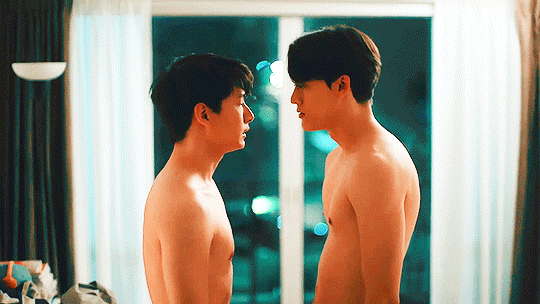
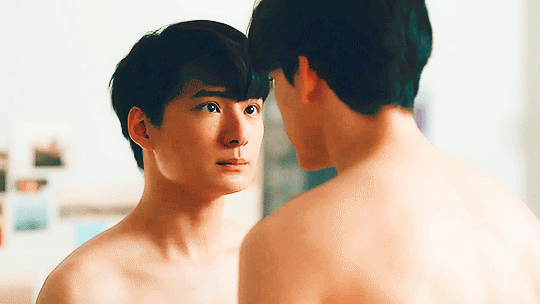
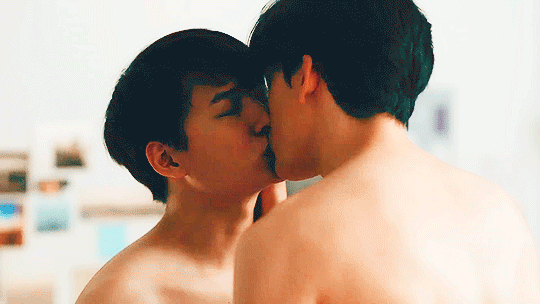
(nicely colored gifs by @piningbisexuals that portray everything i want to point out, thank you)
It's the blinking eyes, heavy breathing as soon as Kawi sheds his shirt, the swallowing, neck muscle twitching, furrowed determined eyebrows) and several little nods when he responds to 'Are you sure'?
It's very intentional acting. It's fucking brilliant acting in showing Kawi's anxiety and gosh, Kawi is being so brave to take this challenge and change his whole life once again, I might cry. If he turns out to be ace, I might actually cry but like I pointed out before, for me Kawi's lack of sexual desire is very readable. But no matter what, I have my trust in BMF to tread Pisaeng and Kawi intimacy carefully, it's been great so far and P'Waa knows what he's doing and how he is filming. I just hope it aligns with my wishful thinking.
#be my favorite#be my favorite meta#be my favorite the series#pisaeng x kawi#ace kawi#asexuality#i took courses in cinematography as a cameraman and that's why i pay attention to the framing and visual storytelling and details#i'm not an expert of course but i worked for a while in indie filming#and yes i am still dying on that hill but i understand why people who aren't ace can't notice the signs or don't relate to the dialogue#huh that was long and i already wrote like several posts#thai bl#thai drama#the eclipse#the eclipse series#bl meta#dropthemeta#bmf meta
28 notes
·
View notes
Text
I should do a little visual breakdown of that quirrel nosk comic. I think it's fun to analyze comic choices and share my thought process when composing my own
#rambling#not that I'm a comic expert but i am passionate about and decently competent with this method of storytelling#and breaking down this like this could be cool for others too
4 notes
·
View notes
Text
GOD. HELP. PLEASE FORNTHE LOVE OF GOD. HELP ME <- is slightly self-conscious and extremely worried about doing something Incorrectly
#like i promise my og piece for today was sharena centric I PROMISE. I SWEAR. I PROMISE. ON MY LIFE. I SWEAR#like a rule i set for myself was to include alfonse as little as possible and if he's there he's just There#like i was rambling to my sister about it the other day but like. alfonse is an extremely important part of sharena's life#and like sharena is luigi. younger sibling syndrome. ofc she's gonna bring him up he's a huge part of her life#i still don't have the proper words for it but i said it's like misogyny ouroboros. specific phenomenon#where someone is soooo caught up in perceived misogyny (whether it's there or not) that like.#they don't even give the female chara a chance. like eg camilla or charlotte immediately being written off for being oversexualized#and this type of person ONLY focuses on that and refuses to actually engage w camilla or charlotte as characters#under the guise of like. caring about women. and maybe they do! but the way you're doing it you're eating yourself.#and how this relates back to sharena is like. that 'let female characters exist outside of their male counterparts'#WHICH. SOUNDS GOOD. ON THE SURFACE. but like i feel like it's too easy for some people#to see a female chara have a significant tie to a male chara and immediately decide to write her off as 'just that'#when like. ESPPPP in sharena's case. and esppp in alfonse's case. two things are happening here#sharena and alfonse have VERY different ways of expressing their affection for each lther#sharena more overt and alfonse way more subtle. and then there's the mario and luigi thing happening#where mario exists and stands on his own as The Main Guy. objectively#meanwhile luigi is just always thinking about mario and how cool he is. cause he looks up to him#and like idk idk i am not a mario expert i can't do a full analysis/comparison here but like. that's the dynamic they have.#NONE OF THIS IS RELEVANT. or maybe it's Barely Adjacent. to the entry i'm gonna submit#BUT I FEEL SO BAD.... my big piece had sooooooo much more storytelling i promise...........#the one i'm about to post I PROMISE YOU. it's just concept art and the focus was Not primarily on alfonse i swear to god
2 notes
·
View notes
Text
A longer post because there were some fun dragon things today
I'll be posting the other half (which actually happened first, chronologically) on my other account, but this is the part that I feel like writing out first. Obligatory UPG disclaimer, this is a personal experience so it has no basis in anything other than my own beliefs!
So! Crash course in how I believe reincarnation works for context: I believe that I- and everyone else- have what one would call a "higher self." Think of this like a lake, and each individual incarnation is a little whirlpool. Still part of the overall lake, but it's an individual at the same time. Or, I suppose, you could view it as a cake with pieces or whatever other metaphor you can think of- point is, my soul is whole but I am not all there is to me. My higher self is more aware, and not stuck in a physical body like I am.
My mother works very closely with her higher self. I... somehow just never saw that as an option for me. When I realized I was dragonkin, I immediately knew why; big huge dragon + little tiny human who's easily intimidated and doesn't know that they're a dragon yet = bad time. After I realized that, I decided that when I had the time I wanted to sort of say hello. Today I finally got the chance to meditate and have a chat.
I've understood my Amphitere nature is the draconic form that, in this lifetime, is likely the form it'd be most useful to know of and relate myself to. Not my truest form, but the one that will FEEL truest in this lifetime. So I knew higher self wasn't gonna look like that.
He is... fucking huge. I expected that, but it was still surprising. I couldn't get a good clear image of the body plan or anything, but he had feathered wings. The thing was; he was gold. I asked if he was actually gold, because that would mean that me and my mom separately picked up on that, and the following conversation ensued:
"Wait, so are you really gold?" "Yes.... sort of?" "WAIT OH MY GOD ARE YOU SHRIMP COLORS?????"
He laughed and said yes. I asked in the first place because it was something I just suddenly knew intuitively; gold is really the closest in energy that a human can perceive, but if I had a wider spectrum of color available to me he wouldn't look the same.
After some chatting I asked if he could help me connect us a little better, because I just... have a hard time looking at this massive fucking dragon and going "you're me, but big! :D" like no that's a dragon. Who am I to claim that that's me. Wtf. And after a moment, I just... sort of felt these massive fucking wings?? not my blue ones, but HIS wings. On my back. The full wingspan of them wouldn't even fit in my fucking room, it was wild.
Also, Loki and I have worked together WAY LONGER THAN I THOUGHT???? I asked higher self if he had worked with Loki, not as me, but as him and he and Loki looked at each other like they were in on some joke and I wasn't. I shit you not, he just sort of...
"Not... all lifetimes, just most of them-" LIKE THAT'S WAY MORE THEN A DOZEN, WHO WAS GONNA TELL ME THAT???
Anyway the punchline of this was the "shrimp colors" I just wanted to put the rest of that so I remembered, I fucking cannot deal with how weird my practice is getting over here XD
#I posted this hella late I'm just bored#so plz ignore any typos or incoherency#I'm a storyteller yes#but I am not like#good at telling the stories of my meditations yet I think#I also gotta remember to talk about astral shit on my main at some point#bc I'm no expert at all#but I have an experience that I'm curious if it's like... just a me thing or if anyone else has had it happen???#anyway back to ur regularly scheduled program#otherkin#witchcraft#otherkin community#amphitere kin#otherkinity#otherkin blog#nonhuman#dragonkin#alterhuman#witchblr#dragon witch#witchblr I know I tagged you guys but plz don't jump me for being dragonkin
6 notes
·
View notes
Text
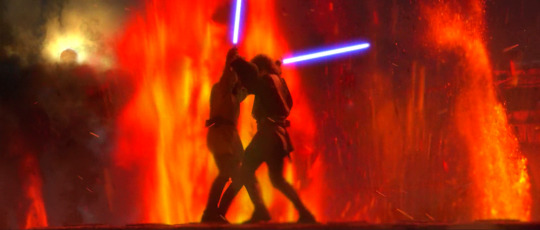
‘Revenge of the Sith may be the greatest work of art in our lifetimes...’
(an excerpt from a long-deleted blog post, archived here)
“Revenge of the Sith is still (and probably always will be) the greatest thing that will ever come out of the Star Wars franchise. I always go further, in fact, and say that it’s the greatest thing that will ever come out of big-budget, action/fantasy cinema at all. George Lucas’s final contribution to his Star Wars legacy—2005’s final prequel offering—was not only an artistic, cinematic and operatic masterpiece, but it was the ultimate, consummate manifestation of everything Star Wars was capable of being and, for that matter, everything that big-scale cinema is capable of being.
It literally does not—and probably can’t—get better than this ever again.
Lucas, who himself pretty much set the standard and invented the genre in 1977, had now taken us to the absolute zenith of what that genre of film-making could produce.
Epic, ambitious, stunning, moving, nuanced, and everything else, it was the glorious completion of Lucas’s original Star Wars saga that I had been waiting for—and something for which I will always be immensely grateful George Lucas came back to film-making to give us. I have already made the case at length for why Revenge of the Sith was an absolute masterpiece of staggering proportions, so I’ll refrain from re-stating here all the ... reasons I eternally bow at the altar of that film and its unfairly maligned architect.
People who didn’t get it or still don’t get it probably never will get it.
I’ve given up arguing with those on the tedious backlash bandwagon, those who join in with the Lucas-bashing for the sake of YouTube channel views, or those who, like [spoilt children] throwing a tantrum, bitterly disavow George Lucas and whine about how the prequels ‘ruined Star Wars’.
Someone who did get it, however, was the noted author and social critic Camille Paglia: she of course famously declared a few years ago that George Lucas was the greatest artist of his time and specifically that Revenge of the Sith was the greatest work of art in the last thirty years.
The respected, if often controversial, academic Paglia didn’t argue that Episode III was merely the best movie of the last thirty years… but the best work of art in any genre and in any medium.
[...] Predictably a lot of people either assumed Paglia was being sarcastic or they simply pooh-poohed her conclusions. Paglia, however, was not trying to be ironic, and she has reaffirmed and defended her position over and over again and with a passion—Lucas’s final Star Wars film, she maintained, is the greatest work of art in the last three decades.
[...] I cannot think of any film in any genre that has been as absorbing or as immaculate (or as ambitious). Even just conceptually, what Lucas tried to do with the prequel trilogy was staggering and is without any parallel. And while we could argue that the execution was off-the-mark in certain places, the sheer visceral power and broad artistic value of what he did manage to create—even with its various failings—puts Lucas’s saga (and ROTS in particular) into a different stratosphere entirely.
In her own view of it, Paglia especially focuses on the final act of the third prequel—the climactic finale centering on the extended Anakin/Kenobi lightsaber duel against the dramatic lava backdrop and the extraordinarily powerful way that the birth of the Skywalker twins is juxtaposed with the ‘death’ of Anakin and ‘birth’ of Vader. That latter sequence, by the way, in which the death of the mother coincides (and even feeds into) the birth of the ‘dark father’, all of it underscored by John Williams haunting, gothic choral/hymn composition, is just one example (among many) of Lucas’s extraordinarily acute and nuanced levels of vision.
‘The long finale of Revenge of the Sith has more inherent artistic value, emotional power, and global impact than anything by the artists you name,’ she said in this interview with Vice. ‘It’s because the art world has flat-lined and become an echo chamber of received opinion and toxic over-praise. It’s like the emperor’s new clothes—people are too intimidated to admit what they secretly think or what they might think with their blinders off.’
youtube
Speaking to FanGirlBlog, Paglia continued her celebration of Lucas’s final masterwork, saying, ‘I have been saying to interviewers and onstage, "The finale of Revenge of the Sith is the most ambitious, significant, and emotionally compelling work of art produced in the last 30 years in any genre—including literature".
Paglia’s assertions flowed from her 2012 book Glittering Images: A Journey Through Art from Egypt to Star Wars, which in part addressed the problem of modern cultural ignorance and the author’s worries that 21st century Americans are overexposed to visual stimulation by the “all-pervasive mass media” and must fight to keep their capacity for contemplation.
In the book, Paglia discusses twenty-nine examples of visual artwork, beginning with the ancient Egyptian funerary images of Queen Nefertari, and then progressing through various artistic works, including creations from Ancient Greece to Byzantine art and Donatello’s ‘Mary Magdalene’.
She explained, ‘Lucas was not part of my original plan for Glittering Images, which has 29 chapters crossing 3000 years. My goal was to write a very clear and concise handbook to the history of artistic styles from antiquity to the present. When I looked around for strong examples of contemporary art to end the book with, however, I got very frustrated. There is a lot of good art being made, but I found it overall pretty underwhelming. When I would happen on the finale of Revenge of the Sith, I just sat there stunned. It grew and grew on me, and I became obsessed with it. I was amazed at how much is in there—themes of love and hate, politics, industry, technology, and apocalyptic nature, combined with the dance theater of that duel on the lava river and then the parallel, agonizing death/births. It’s absolutely tremendous.’
Paglia also entirely recognised the sheer scale of Lucas’s creation and the value of even its various constituent parts as important or worthy works of art. ‘The fantastically complex model of the Mustafar landscape made for the production of Revenge of the Sith should be honored as an important work of contemporary installation art,’ she argued. ‘And also that Lucas’ spectacular air battles, like the one over Coruscant that opens Sith, are sophisticated works of kinetic art in the tradition of important artists like Marcel Duchamp and Alexander Calder. No one has ever written about George Lucas in this way—integrating him with the entire fine arts tradition.’
The problem is that Lucas and the prequel trilogy have become so widely misrepresented as ‘bad’ that most people don’t know how to deal with someone like Paglia sincerely proclaiming “Nothing in the last 30 years has been produced—in any of the arts—that is as significant or as emotionally compelling as Revenge of the Sith…”
[...] In fact, contrary to widespread misconceptions about how the Star Wars films are viewed, a Rotten Tomatoes poll ... found that Revenge of the Sith (and not Empire Strikes Back) scored as the best-regarded of the [Lucas] movies according to aggregation of archived reviews. So the idea that everyone dismisses the prequels seems like a misconception; but it is fair to say that a substantial body of people —including a lot of people who, rather incongruously, regard themselves as Star Wars fans—do completely dismiss this film along with its two predecessors.
As I said at the start, people who didn’t get it or still don’t get it probably never will get it.
But what has always struck me as pitiful about the whiny ‘Lucas Ruined Star Wars’ attitude is that it seems to flow from the premise that Lucas—a man whose stubborn commitment to his own singular vision gave an entire generation from the late 70s and early 80s unparalleled joy—somehow ‘owes it’ to those same people to do things precisely how *they* deem acceptable. That’s essentially what it comes down to—that he, as the artist, should make the art that the fans or the public want and not follow his own creative vision.
What people don’t realise, however, is that if he had done that from the beginning, there never would’ve BEEN an original Star Wars trilogy at all—and arguably all of these huge blockbuster SF/fantasy films that people spend their money seeing today wouldn’t exist either. What a lot of people also don’t realise is that Lucas was never setting himself up to be a populist or even mainstream filmmaker. On the contrary, he was the avant-garde film geek, the rogue, the outsider. The fact that Star Wars spiraled into a billion-dollar behemoth was an accident; and when the first Star Wars movie was released in 1977, it was an oddity that no one in the film industry understood or believed in.
But Lucas had stuck to his own creative vision—a vision that was largely incomprehensible to everyone else at the time the film was being made—and his singular vision hit the mark big-time and accomplished something unprecedented.
By the time of the endlessly-maligned The Phantom Menace in 1999 and everything that followed, Lucas was still doing exactly the same thing—following his own vision, trying to create something extraordinary and largely ignoring contemporary trends or opinion. The only difference was that the vast fan-base he had acquired from the original films were older now, far more jaded and over-saturated with blockbuster movies (most of which were influenced by Lucas’s pioneering work in the 70s) and they essentially didn’t *want* something new, creative or challenging—they just wanted the same thing they’d had when they were kids.
In effect, they weren’t interested in Lucas the artist or Lucas the pioneer—they only wanted Lucas the Popcorn Movie dispenser. But Lucas the Popcorn Movie Dispenser had never existed—he was simply an illusion created by the extraordinary commercial success of the Star Wars Trilogy.
What Lucas had in fact envisioned—and created—with the prequel trilogy, especially Revenge of the Sith, was something that transcended the whole summer blockbuster ennui, transcended genre, transcended the very medium of film itself, and could be discussed in the same breath as Shakespeare, Virgil and the Aeneid, Julius Caesar, and a number of equally fascinating and endlessly debatable works of serious and complex gravity.
But there was an audience of millions who were instead looking for something that could be discussed alongside Jurassic Park or Terminator 2. Which is fine—Star Wars of course can also be discussed just as validly in that latter context too; but it also exists in a stratosphere beyond it. And because Lucas’s process and vision was in that higher stratosphere a lot of the time, there was a frequent disconnect that occurred, whereby a lot of people were unable to meet him halfway or relate to the films on those kinds of levels.
But Lucas pushed on with his long-envisioned trilogy; and by the time the final installment of his Star Wars saga arrived in 2005, a sizeable proportion of the old fan-base had either departed or were by now just coming to the party for the thrill of seeing Darth Vader one last time. Some dismissed the film the same way as they’d dismissed its two predecessors, some were full of scathing mockery, while others were ambivalent. Some were suitably entertained, but didn’t take it much further than that.
Another group, a smaller minority—myself included—had just seen something of epic, overwhelming proportions and had the greatest cinematic experience of their lives.
But great art is like that.
Great works of art divides people, provoking endless debate [...] An argument could be made that the greatest artist will go all-out to create something special and substantive, even if it won’t appeal to everyone. Said artist would follow his own creative vision and not compromise it to the committee of consensus or demand.
Lucas, it should be borne in mind, never made ANY of the Star Wars films with film-critics in mind—even the Original Trilogy movies were not critically approved, despite becoming cultural landmarks. And interestingly, the hang-ups of many of those who were scathing about the prequel movies—ROTS included—were virtually identical to the hang-ups of the critics in the early 80s who either just didn’t get those original Star Wars films or were unwilling to praise a rogue filmmaker who was rebelling against Hollywood at the time and who was making something entirely out-of-step with contemporary trends and sensibilities.
Fittingly enough, the Lucas who was out-of-step with the sensibilities of the time during the late 70s and early 80s is the same Lucas who was equally out-of-step with sensibilities and trends at the time of the prequels too. In both eras, Lucas rebelled against the sensibilities of contemporary cinema and carved out his own piece of utter magic according to his own stubborn vision—the difference is that so many of the same people who adored what he had done in the first instance couldn’t understand what he was doing in the second instance.
Even though what he was doing was essentially the same thing.
For that matter, I always suspected that one of the main reasons so many people failed to appreciate (or in a lot of cases, to even understand) this film is precisely because it isn’t contemporary. That’s a key thing to understand about the Star Wars prequels—they were not made in a contemporary style.
Lucas doesn’t make contemporary cinema. Both of Lucas’s Star Wars trilogies are written and designed specifically to NOT be contemporary, but to have a more timeless quality, steeped in traditions from the past.
Lucas, you have to remember, has never been a contemporary or generic filmmaker, but a more avant-garde artist and experimenter who foremost specialises in tone and impressionism. The fact that he invented modern blockbuster cinema is purely an accident. As he himself once said, “None of the films I’ve done was designed for a mass audience, except for ‘Indiana Jones.’ Nobody in their right mind thought ‘American Graffiti’ or ‘Star Wars’ would work”.
[...] They were not contemporary or generic at all—consequently, a lot of people didn’t understand or relate to what they were watching: because they couldn’t find a point of comparison in popular culture.
To really understand these films, you have to go back to some of the historical epics of the fifties and sixties, particularly films like Ben-Hur, Cleopatra or Spartacus. If you watch any of those films (and all three are timeless, truly marvelous cinematic works) and then watch the three Star Wars prequels, it will suddenly make much more sense. The acting style, the dialogue style, the themes, the epic scope and settings, the vast mythologizing, the way the films are scored, even the intricate costume design—all of it.
There’s nothing surprising about that. After all, it’s easy to overlook the fact now from our current vantage-point, but the original Star Wars trilogy movies weren’t contemporary in style either—they were stylistically based on things like Kurosawa, Flash Gordon and the Saturday matinee serials of the 1930s and 40s. The original trilogy films made no stylistic sense in terms of contemporary cinema or sensibilities in the late 70s or early 80s—they were, in style, a homage to a long-gone era.
So too were the prequels—just a different homage to a different era.
[...]
When you look at everything that makes up Revenge of the Sith, the scope of vision along with the degree of artistic nuance and juxtaposition is breathtaking.
There’s lots of action, yes, as you’d expect; but the action, like so much of what Lucas was doing by this stage, is almost transcendent. Sure, the acting or delivery is off in a few places; mostly due to some of the actors having to perform in non-existent CG environments—remember Lucasfilm and ILM were breaking new ground technologically in these movies, which we take for granted now with all our CG and digital filmmaking, but which at the time were bound to cause some teething problems. But Ewan McGregor is superb in this film, while the maligned Hayden Christensen....in fact does a solid job in any number of key scenes.
And there’s everything else. The special effects aren’t just good, they’re actually often beautiful in a way that most special effects don’t aspire to be. The level of detail and artistry in the visuals mean you could turn the sound off and still be captivated. Some of the backdrops could make extraordinary paintings that could hang convincingly in art galleries. And Lucas is the absolute master of the establishing shot and the scene transition, turning it into an art every bit as nuanced as in a piece of music.
For that matter, the music is extraordinary—and actually if you look at how underwhelming or non-existent the music is in the post-Lucas ‘The Force Awakens’, it becomes clear that Lucas and Williams had a collaborative process that really influenced how these films were scored (and which is now no longer the case). Lucas himself said that the music was 50 percent of what mattered in these films and that is certainly evident.
Much of it, particularly the climatic Kenobi/Skywalker duel and that final act with the birth of the twins, death of Padme and creation of Vader, almost isn’t cinema at all—but opera. This could’ve been something Wagner was composing if he had ever existed in the cinema age.
In fact, the final few scenes of the film don’t even have any dialogue, but are purely musical and visual. Even some of the most stirring parts earlier on in the film are without dialogue; take, for example, the breathtakingly beautiful sequence of Anakin and Padme trying to silently sense for each other across the exquisite, sunset cityscape—it’s all visual, tone and subtle music, pure emotion with no dialogue. A scene like that could almost be part of a silent movie; and it’s also like an impressionist painting in motion.
Even that Kenobi/Skywalker duel itself is more than just an action sequence. With Williams’ epic, stirring, choral score, it too is opera. But it’s opera married to performance art: the level of intricacy, fluency and speed of Ewan McGregor and Hayden Christensen’s dueling is insane, having required an immense amount of prep and practise. The choreography takes it onto the level of dance; of true performance art as opposed to disposable cartoon violence or cheap blockbuster action.
Everything here—to the last detail—is choreographed like a ballet and it is spellbinding.
Yet while other filmmakers would try to sell an entire movie on such an exquisite centerpiece, for Lucas all of this—all of this poetry, opera, dance, music, visual art and everything else—is ultimately mere constituent part to a greater whole: a Shakespearan epic of a tortured fall from grace and a Greek tragedy... wrapped within an even larger epic about the fall of a Republic, the fallibility of religion and the genius of the Devil and failure of the angels.
[...] What Lucas created in fact was the ultimate expression/culmination of the art of the epic itself—fittingly enough, in order to conclude the defining epic of our modern times (what Brian Blessed once described as the Shakespeare of our age). The Shakespeare comparisons aren’t trivial. The evident Star Wars/Shakespeare resonance has even prompted things like Ian Doescher’s book William Shakespeare’s Tragedy of the Sith’s Revenge: Star Wars Part the Third—a retelling of Revenge of the Sith as if it had been written by William Shakespeare for real.
[...] Various observers, including academics, have noted the obvious fact that Lucas’s story is also a retelling of the fall of the Roman Republic and birth of the Roman Empire. Lucas himself admitted this, pointing to how Revenge of the Sith in particular is partly a story about democracies become dictatorships and citing the historical stories of Caesar and Augustus. You can quite easily watch the prequel trilogy alongside I, Claudius or something like HBO’s brilliant Rome series.
But none of those references or allusions are the important part. Even the fact that the prequel trilogy—and again, ROTS in particular—is quite clearly in part a story about false-flag wars, banking conspiracies, the corporate and military-industrial complex, the Bush administration and the Iraq War, etc—isn’t particularly relevant to the issue of why it’s such an epic work of significance.
Lucas is the author and architect of our preeminent modern mythology—as interviewer Bill Moyers asserted during his fascinating and revealing 1999 interview with Lucas (for the release of The Phantom Menace). Partly inspired by his friend Joseph Campbell’s thoughts on mythology, but moreover informed by his own careful distillation of elements from various cultures and civilisations (what he has referred to as our collective human ‘archaeological psychology’), Lucas is every bit as influential as Virgil, Homer or Shakespeare were in their respective times, and has crafted out the ultimate mythological saga.
Revenge of the Sith is the final, completing piece of that saga—the piece that gives the saga its full scope and true soul, and the piece that makes every one of the other films count for so much more.
And it does it so well—with such vivid and breathtaking quality—that, even having written an article as long as this one now is (and another before this), I still don’t feel like I’m adequately able to explain its full brilliance.
Neither could Lucas himself, I suspect. I’m not sure Lucas even realised how masterful it was; but, as Paglia and others note, the guy is so mild-mannered and self-deprecating that it simply wasn’t in his nature to boast about his own work. Instead he just took in all the abuse and mockery with mild bemusement, shrugged his shoulders and walked off into the twin sunset, knowing that with Revenge of the Sith he had finished what he’d come back to do.
In fact, what Lucas did was so extraordinary, so complex and so nuanced that it may take another decade or two for people to even appreciate it properly—assuming they ever do. As film experts like Mike Klimo have noted, some of what Lucas did in ROTS and the prequels may have been so sophisticated that he deliberately didn’t talk about it, but just left it there, not knowing that anyone would ever even notice.
This, as I said earlier, goes beyond cinema, and possibly even beyond Star Wars itself. Lucas genuinely outdid himself, and it is unlikely anyone will reach that height again—firstly because no one is going to be in the position Lucas was in again in terms of total ownership of a property, and secondly because no one is going to have that kind of ambition again, especially having seen how much of a backlash Lucas received from the legions of popcorn munchers, YouTube profiteers and ungrateful fans who were really looking for something much more in keeping with a generic, formulaic, standardized blockbuster formula.”
#the prequels#revenge of the sith#rots#george lucas#prequels appreciation#lucas' star wars as created-myth#Paglia is an expert on the Fall of Civilizations#which explains her fascination with RotS in particular#as for the blogger who wrote the post...i don't necessarily agree with every single thing he says#particularly his view on some of RotS' themes#(he seems to miss the fact that the Prequels are not about love as a negative element but are rather about the Fear of Loss )#(Anakin's tragic flaw is not Love but rather his FEAR losing his loved ones to Death)#but there's enough here i found worthy of sharing (and you can read the rest on the wayback machine link)#ultimately i feel that the inability of contemporary audiences to appreciate Lucas' work#is very much akin to the bafflement with which Tolkien's work was met in the mid-20th century#Tolkien was writing in deliberately archaic medieval tradition during the very height of the Modern era#and similarly ...#Lucas was making homages to old-fashioned cinema/Greek tragedy/and mythic Romanticism during the peak of cynical Post-Modernism#audiences seem to have truly have LOST the ability to comprehend older forms of storytelling#and that is the real tragedy
31 notes
·
View notes
Text
one last thing before i go to bed finally but it's so fucking rare to get a show that is made with sheer excellence that builds and continues to get better and better with a phenomenal cast AND crew and ends when it's actually supposed to and the ending however tragic or not it may be is actually wrapped up neatly in a bow and you KNOW it couldn't have ended any other way. im so happy we experienced this. i feel very lucky. this will go down as one of the best series ever made. it already has, but it just needs to be said. holy hell.
7 notes
·
View notes
Text

Pop Fizz is a gremlin alchemist who is one of the Magic Skylanders in Skylanders: Giants. His Series 2 counterpart, introuced in Swap Force, is called Super Gulp Pop Fizz, and his Series 3 counterpart from Trap Team is Fizzy Frenzy Pop Fizz.
#Skylanders#Skylanders Giants#Skylanders Swap Force#Skylanders Trap Team#Skylanders Imaginators#Skylanders Universe#Magic Skylanders#Male Skylanders#Playable Characters#LightCore Skylanders#Core Skylanders#Series 2 Skylanders#Helper Spawning Skylanders#Series 3 Skylanders#Skylanders with Chageable Forms#Imaginators Characters#Storytellers#Expert Skylanders#Gremlins#Pop Fizz#LightCore Pop Fzz#Super Gulp Pop Fizz#Fizzy Frenzy Pop Fizz
17 notes
·
View notes
Text
now that i think about it this kind of counts for lore too. i love stuff where character and world lore is REALLY heavy and detailed, or its more stripped down but has all of the 'guiding points' where you can come up with those things yourself
i like creating that gap for myself or playing in the depths that were already created. my mind likes thinking of the making stuff up variety and it really bonds you to a piece of media
sometimes if the media is rly bad it can bond you to it out of spite by making you create an alternate timeline totally for yourself LOL but im more talking about the really good stuff
#case in point smth like genshin where they have rly heavy lore often in text form that you can kind of use as a basis to think abt stuff#especially cause often we dont get certain character interactions for years or months after they get added#laughs in chiscara and slams fist on floor ow the horrors#holic a good example cause the lore is rly rich but the storytelling is mostly emotional based rather than long lore rambles#and we dont see into everyones brains equally but often we see how they feel from gestures and can fill in the blank#with holic especially it feels like.... especially for characters like doumeki theres a creativity to it but ur still getting the point#like its highly intended it feels like a guided conclusion#but also it sets up stuff like roles and mental states so masterfully you can make headcanons in perpetuity that feel 'expected'#lots of my personal hcs come from that expert character setup that can merge well with personal ideas#i mean thats kinda what headcanons are anyways but its hard to explain?#but yeah strong character writing goes a looooong way and comes in many forms#ramblings
4 notes
·
View notes
Text
Okay, one last thing. The problem with the lighting issue is that it undermines the story that the creators are trying to tell. On a simple practical level, a dimmer scene means that less of the image sticks out readily to the viewer. Meaning there are fewer opportunities for little details that you, the creator, have put in to flesh out the character and emotion that you’re going for to poke the viewer in the brain and make them feel something more viscerally without them even knowing it. Like the music. That’s what the music is there for, to make the viewer feel something without them noticing. That’s why it’s a problem when you can’t see something on the screen. You’re reducing the information you can beam straight into your audience’s skull without their consent.
(You can also push this intensity of information too far. I’m not sure whether it’s the lighting or modern cameras picking up too much detail, but the props all looks like toys to me. Might just be the way I’m watching them and they look perfect on a more typical tv that’s larger and further away from the viewer, like a stage prop needing to look good for the cheap seats. I don’t know.)
The second issue, more relevant to this specific episode, is that you’re not using your lighting to tell your story. You’ve got these two characters walking through the ruined halls of their people’s homeland. One is an idealist, believing in the rituals and traditions of his people from the depths of his heart. The other is a cynic who actually experienced their homeland at its height. To her, the rituals were a practical tool to keep the masses in line, nothing more. The two come upon the sacred waters that the idealist was searching for, and the cynic is emotionally affected by the idealist’s devotion when he submerges himself, maybe feeling that there’s something special about the rituals after all. Now, shouldn’t we get some kind of flattering or ethereal lighting on the water and the surrounds as Din submerges himself. The dim, naturalistic lighting fits her perspective, not his. I’m not even meaning that the show is subtly supporting Bo Katan’s point of view, not Din’s. I’m meaning the storyteller’s are leaving tools on the table that could help them get their point across.
2 notes
·
View notes